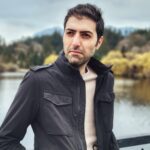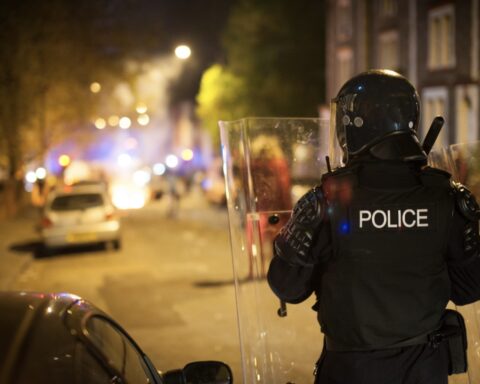In a story of hope, Mustafa Popalzai, now a Detective Constable of the Toronto Police Service’s Homicide Unit and co-founder of Project Hope, reflects on his journey from Afghanistan to Canada. His journey, with its ups and downs, led him to become an inspiring example.
More than two decades have passed since Popalzai and his family landed in Toronto. He recalls that his dad started receiving death threats from the Taliban due to his career as a freelance artist. As a result, they planned to come to Canada in 2000, when Mustafa was 14 years old.
However, like many refugees, their transition was filled with challenges — leaving behind their homeland, adapting to a new culture and building a life from scratch. Mustafa highlights the challenges his family faced.
“One of the significant problems was my dad’s struggle to find employment; he had a large art gallery and a well-paid position,” Popalzai said, referring to their time in Afghanistan.
They gradually integrated into Canadian society, and Popalzai pursued his education, earning a bachelor of arts degree that focused on law and a master’s degree in legal studies from Carleton University.
His migration to Canada as a young refugee shaped how he sees life and the value of community support. “Unlike most other officers, I never wanted to be a police officer,” Popalzai says. “One of the reasons for that was because of everything I had known about police officers while growing up. From where I came from, what I’ve seen as a kid, policing was not the position or job that I wanted to join due to corruption and just them not living up to the standards of what a police officer should be.”
He remembers that for the first 10 years living in Canada, he never even spoke to a police officer, “but thank God I know my perception changed a bit. I have always wanted to be a lawyer. I went ahead and did my masters, and I had plans to go to law school.”
However, he got to work with the Toronto Police Service as a civilian. While working with them, he learned more about policing, its culture, and what it means in Canada. He believes it’s one of the best decisions he’s ever made: “I feel that I could give back to my community and I could help people.”
In August 2021, when thousands of Afghan refugees came to Canada after the Taliban government assumed control of the country, Popalzai and his Iranian colleague, Farzad Ghotbi, who also came to Canada as a refugee, found themselves helping refugees under Project HOPE.
“We’re both been working together and then, we’re watching the news of what was happening in Kabul, Afghanistan. Very unfortunate scenes of people losing their lives while trying to flee the airport.” He recalls the viral footage, showing a large U.S. Air Force cargo plane taking off from Kabul airport, with many desperate Afghans trying to board the aircraft.
“Some of them fell from the plane, and it was difficult for me to see all that. The country changed so fast overnight, and all the progress of the last 20 years disappeared suddenly,” Popalzai said.
At that time, Canada’s government announced it would admit thousands of Afghans whose lives could be at risk under the new Taliban regime. Since then, more than 30,000 Afghans have been resettled in Canada.
They were thinking, what can they do here as police officers to assist some refugees and newcomers coming to Canada because Ottawa aims to admit 40,000 Afghan refugees by 2023-end.
Less than 24 hours after the first plane landed in Canada, Popalzai and Ghotbi drove to area hotels to see the newcomers in person. “I was seeing kids with no shoes or sandals,” Popalzai said. “I saw many newcomers with the original clothing they wore when they left Afghanistan just walking around these hotels and sitting under trees. Seeing us in uniform, they were all scared and intimidated at the beginning. They soon realized that we were there to help them and not really question or investigate them for anything else.”
For Popalzai, this felt like déjà vu. “I was looking at the kids, and could picture myself coming in.”
The donations were made month after month, and at the same time, people were asking for information sessions. “One thing that we added with our project, which I’m proud of, is hosting the information sessions for the newcomers to teach them about basic Canadian laws and the role of police in Canada because we wanted to make sure that they understand that policing is a lot different than what they were used to in Afghanistan,” Popalzai said.
The tables were now turned, and he was now able to help others. “Once they left the hotels and they got their rental units, we took the donated items to their homes,” Popalzai added. “And after two years, $600,000 worth of donations were hand-delivered to these newcomers and refugees.”
Their efforts have extended beyond Canada, including providing earthquake relief in Turkey and Syria; Popalzai says, “The project is still ongoing; we’re also helping the newcomers who are now arriving from North Africa. This year we helped with a large donation of over $112,000 that we collected.”
He believed humanity drives him to engage in humanitarian work internationally.”When you see people suffering regardless of their skin colour, religion, race or ethnic background, in any part of the world, it breaks your heart,” Popalzai said.
Mustafa continued: “If I could have helped people, in any corner of the world, I would have, but a lot of the time it’s impossible or difficult for us, especially police officers.”
Presently, Popalzai is involved in a mentoring initiative for newcomers and refugees aspiring to enter the police force. “I get over 150 messages from people that want to join the career, and most of them are like, wow! They see you or somebody else who is like them in the field, and this motivates them to give back to their communities. So, it opens a lot of doors. The impact is huge.”
Popalzai’s message for newcomers and refugees fresh to Canada is to be patient.
“It won’t be an overnight fix, especially when you’re new to a country. It takes some time to adapt and adjust to your life. But remember, the future will always be bright if you work hard, stay on the right track, and do the right things.”
Popalzai believes that “living in a country like Canada provides everyone with the opportunity to fulfill their dreams.”
“There’s an answer to any question you have. You just have to look for it. If you don’t know, keep asking, and don’t be shy. Always remember that if you work hard and stay on track, you will achieve all your goals, especially in a country with many opportunities like ours. The question is: ‘How bad do you want it?’”
A Vancouver B.C based journalist who writes about the Iranian community in Canada, art, culture and social media trends.





